Welcome to the latest issue of Life Ed Queensland Pulse.
You might have noticed some changes since our last newsletter. To celebrate a fresh look in 2022, we have a fresh name – Life Ed – and a new look and logo.
Our much-loved mascot, Healthy Harold the giraffe connects to many Aussie children – and now features front and centre, spots and all!
While our name has changed and our programs evolve, our vision remains the same: generations of healthy young Australians living to their full potential.
As we reach the halfway point of another school year, I acknowledge the incredible work of our Life Ed team and educators, and the challenges faced by the hundreds of schools we partner with. COVID continues to cause disruptions, but despite that, our program is truly welcomed, and we value every school partnership.
From Doomadgee in the northwest to Stanthorpe in the southeast, parents and teachers are telling us that more than ever, they need ongoing support with contemporary and difficult issues, such as consent, cybersafety, bullying and mental health, as well as our core program content – which teaches children about healthy eating, personal safety and the harms of cigarettes, vaping and alcohol.
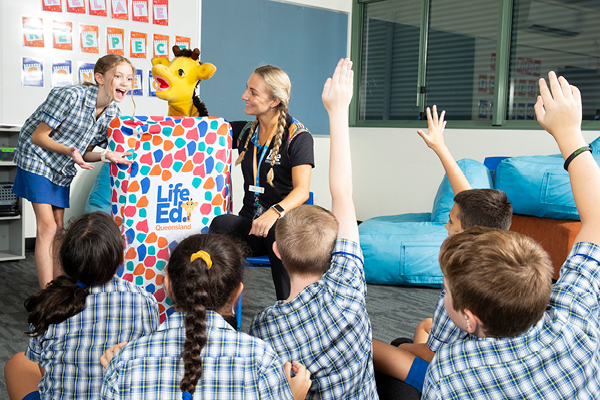
As you will see in this Pulse issue, we have much to celebrate already this year (click the links below to skip to the story):
The Healthy Harold Hundred challenge is back in 2022, and it’s bigger and better. The Life Ed Qld team have put together an amazing campaign which features fun, prizes, and plenty of inspiration.
From June 1, influencers, community role models, media ambassadors and Queenslanders of all ages are set to join the MOVEment to walk, run or ride 100ks over 30 days to help tackle the problem of bullying and violence before it happens.
All funds raised will help support the vital work of Life Ed Queensland in travelling to schools in all corners of the state to teach much-needed bullying prevention programs across Queensland.
So, what are you waiting for? Jump online now and register for this year’s Healthy Harold Hundred or grab a friend and form a team. You’ll have fun, get fitter and help Life Ed make a big difference in the lives of Queensland kids.
To register or find out more – https://www.healthyharoldhundred.org.au/
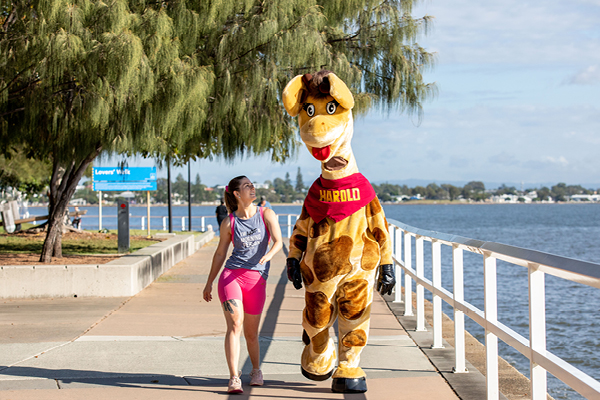
In March, Life Ed Queensland was proud to take the lead on the critical issue of bullying.
In one of our largest ever parent surveys – we asked 13,000 parents of primary school age children who attended our program to rank their top concern from a list of issues including cyberbullying and bullying, cybersafety, mental health, alcohol, smoking and drugs, sexual health and obesity.
Bullying and cyberbullying ranked the top worry, with 6256 parents saying the issue was their number one concern, followed by cybersafety (3445 parents) and mental health (2442).
The survey follows numerous tragic teen suicides triggered by cases of cyberbullying, catfishing and online sexting.
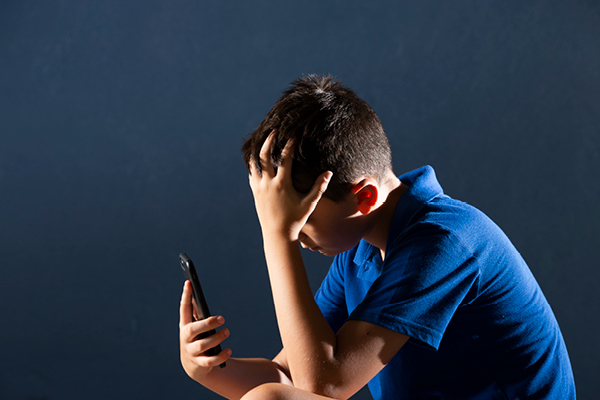
“When we surveyed parents in 2020, bullying and cyberbullying ranked the third biggest concern, it’s now top, so, in just one year, it’s gone from 18% of parents saying it was their main concern to 47% citing bullying and cyberbullying as their primary concern,” Life Ed Queensland CEO Michael Fawsitt said.
“The survey reinforces what we are hearing from schools, that there’s an urgent need for ongoing safety programs, like those provided by Life Ed Queensland, to educate students about how to stay safe online and seek help, and strategies to build positive relationships with peers in person and online.”
The bullying findings from our parent survey featured across the media – in News Corp papers and on ABC Radio, 9News and 7News.
We’re celebrating another milestone for Life Ed Queensland’s award-winning Healthy Eats program, with an external evaluation by Griffith University School of Social Marketing highlighting the powerful social impact of Healthy Eats and its longer-term impact on reducing obesity.
Griffith found Queensland schools who participated in Healthy Eats across the year, increased their vegetable gardens, introduced more fruit and vegetable breaks and saw major improvements to tuckshop menus.
Other initiatives included nutrition information for parents and professional development for teachers.
Overall, the evaluation found students had a greater opportunity to eat healthy food compared to before the Healthy Eats program came to their school. But Griffith went a step further with a social impact value estimation that offers tangible evidence of the program’s wider public health impact.
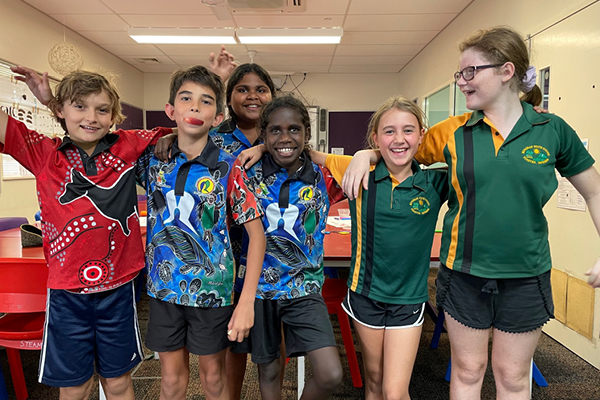
Looking at 1,195 students in Year 5 from two schools, who participated in the program’s fruit and vegetable passport competition, Griffith estimated the dollar impact on obesity prevention: approximating more than $200,000 in health, social and economic costs would be saved per year – just for those 1,195 students.
In other words, Healthy Eats is playing a leading role in improving health outcomes for an entire cohort of young people, simply by increasing the serves of fruit and vegetables that students consume. That’s real impact!
CEO Michael Fawsitt says the external evaluation provides strong evidence of how the targeted, place-based approach of Healthy Eats is creating healthier school food environments.
“Programs like Healthy Eats enable Life Ed to not only be a provider of educational content, but a key influencer and driver of change in school policies and practices, that lead to schools creating a healthier environment where children are encouraged to make healthier food choices, where healthier foods are more accessible, and where eating vegetables and fruit is normalised for kids,” Mr Fawsitt said.
“Obesity is a massive health challenge, and we need to be innovative in our approach to tackling it. I think this program can only continue to grow and improve because of our learnings from this evaluation.”
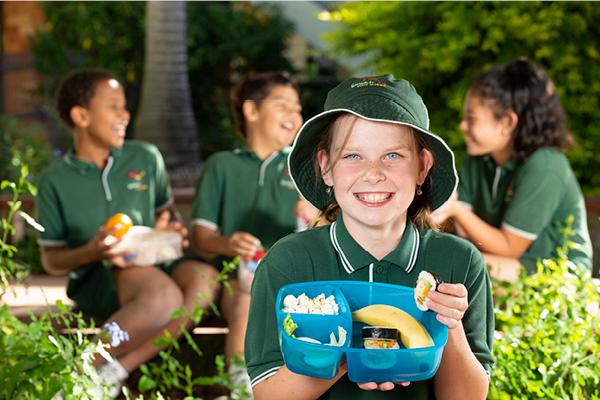
Learn more about the Healthy Eats program here – https://lifeeducationqld.org.au/healthy-eats/
We all know that eating vegetables is important for our growing kids. So how can we get our children to eat more?
Research conducted by Woolworths last year found that Aussie children are becoming less aware of where the food on their plate comes from, and many couldn’t identify common vegetables. Less than half of the kids could identify a beetroot or leek!
Before we even get vegetables onto the plate, helping children to learn how they grow has been demonstrated to increase a child’s willingness to try vegetables and increase their preference for consuming them, along with a host of other benefits.
Now, Life Ed is bringing you a free digital resource from our major partner Woolworths Fresh Food Kids.
Woolworths have relaunched the Fresh Food Kids Discovery Tours program with an exciting digital twist! After launching for Year 5 and 6 classes late last year, and with wonderful feedback from kids and teachers, Woolworths have now made this available for all primary school learning stages and even early learning centres.
The free re-designed program is an in-class experience and has been created with teachers, a nutritionist and an agronomist! Teachers get a free classroom kit with all the materials they need and a lesson guide.
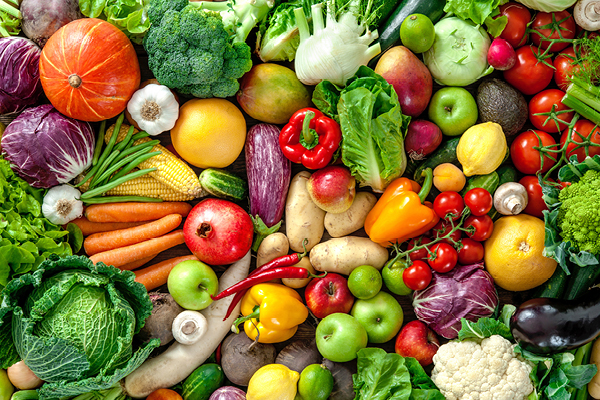
Based on the learning stage, kids will explore where fresh food comes from, with activities including stepping onto a farm and seeing how fruit and vegetables are grown. They’ll immerse themselves in the fascinating world of seeds, plant ecosystems, sustainability, and the farm-to-table journey, with some engaging digital augmented and virtual reality activities, right from the comfort of the classroom.